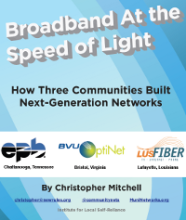
Fast, affordable Internet access for all.

Northern District Mississippi Public Service Commissioner Brandon Presley is unhappy with a new state law that will strip oversight over AT&T. Presley plans to personally file suit in Hinds County Circuit Court against the law, calling it unconstitutional. “It violates the state constitution,” Presley said of the bill during an interview with the Daily Journal. “There’s no doubt AT&T is the biggest in the state, and this bill will allow them to raise rates without any oversight at all.” House Bill 825 strips away rate regulation of Mississippi landline service and removes the oversight powers the PSC formerly had to request financial data and statistics dealing with service outages and consumer complaints. The law also permits AT&T to abandon rural Mississippi landline customers at will.As we've seen elsewhere (as in California), AT&T worked with ALEC to push this through - though Rep Beckett (R-Bruce) doesn't think AT&T will raise its rates or abandon parts of the state. Time will tell - but Beckett won't be the one to suffer when the inevitable occurs. Thanks to AT&T and ALEC, he already got his.
Just this week, the Office of the Legislative Auditor General of the State of Utah released a report to the Utah Legislature on UTOPIA. The report, titled A Performance Audit of the Utah Telecommunications Open Infrastructure Agency rehashes prior criticisms of UTOPIA and tells the abridged story of the Auditor's understanding of UTOPIA's financial troubles.
While one can accept the report as truthful, it certainly is not comprehensive. Jesse Harris, of FreeUTOPIA notes that leaving out certain pieces of information taint the presumed impartiality of the report. From Jesse:
The Legislative Auditor General has published an audit of UTOPIA, and, as expected, it drags a fair amount of ancient history back into the spotlight. The report concludes that additional accountability will alleviate the problems that UTOPIA has experienced, but it missed the mark on a number of points.
The Audit Scope and Objectives are spelled out in the beginning as:
Members of the Utah Legislature asked for an audit of UTOPIA so residents of UTOPIA member cities might know how the organization has used its funds. Legislators also asked for a review the organization’s general management practices. To address their concerns, we developed an audit plan to review the following areas:
- The size and use of UTOPIA’s debt financing
- The causes leading to UTOPIA’s current financial condition
- UTOPIA’s management and board governance practices
While there are many bar graphs, pie charts, and dollar signs in the report and it seems to meet the scope and objectives, financial information alone does not explain UTOPIA's troubles. The first place to look is close to home.

South Carolina's H3508 has passed the legislature, been signed by Governor Nikki R. Haley, and has revoked local authority to build the broadband networks they need to create new jobs. Last week, we noted some of the coverage about the bill. After reviewing the language of the bill, we are astonished at how far the Governor and the South Carolina Legislature have gone to protect AT&T's monopoly, to the detriment of the many businesses and citizens who desperately need better access to the Internet -- whether to be more productive, competitive, or just take advantage of educational opportunities.
South Carolina is near the bottom of adoption rate in the U.S. and has a higher than average number of residents living below the poverty line. Communities with fast, affordable, and reliable access to the Internet are seeing new jobs. Those stuck on slow DSL are watching jobs wither away.
We continue to be amazed at state legislatures that are prioritizing laws to make it harder to expand broadband rather than easier. The only explanation is the vast amounts of money big companies like AT&T and Time Warner Cable spend in campaign contributions.
This bill is designed to prevent local governments from building next-generation networks, even when the private sector has refused to invest. It may also put an end to projects already in the works (even those that have received BTOP or BIP funding).
Last week, South Carolina's General Assembly passed H3508, the ALEC and AT&T bill we previously warned you about. AT&T, ALEC, and cable companies pushed this bill to limit broadband competition and revoke local authority to decide if public investments in broadband infrastructure are wise.
H3508 is one of the worst pieces of legislation we have seen. States usually incorporate language that "grandfathers in" existing projects as a way to avoid legal challenge and federal scrutiny of their anti-competition legislation. In South Carolina, however, crafty drafting puts one county BTOP project in the cross hairs while permitting two other projects to continue.
Below is a roundup of media coverage of the bill. We will soon release our analysis of the supposed "exemptions" to this bill but in the meantime, this coverage explains several of the problems with South Carolina's latest Monopoly Protection Act.
Ars Technica's Cyrus Farivar contacted Jim Baller, a preeminent telecom attorney and expert in broadband issues:
"States have different ways to achieve the same end—discourage, delay, or derail public broadband initiatives," wrote Jim Baller, a telecom lawyer based in Washington, DC, in an e-mail to Ars on Thursday. He noted that similar bills were introduced in Minnesota and Georgia this year, the former of which has led to a "study bill," while the latter did not make it out of committee.
"In some ways, the South Carolina bill is worst of all because it does not grandfather existing projects and would retroactively undermine federal stimulus grants that Orangeburg and Oconee Counties have received," he added.

Farivar also looked into the chief author and found:
Sean McLaughlin from the New America Foundation and Access Humbolt alerted us to HB 1161, an AT&T and ALEC driven bill to scale back state regulation of Internet services. Sen. Alex Padilla (D-SD20, San Fernando Valley) is a co-author of the bill, introduced in February and moving steadily forward.
Sean tells us:
On Monday, the bill passed CA Assembly's Committee on Utilities and Commerce with only one brave NO vote (Asm. Huffman is also leading candidate for US House for the new CA-2 district). Next stop is Assembly Appropriations Cte. but it will quickly move to the Assembly Floor - NOW is the time to alert all Assembly Members in California to stop this juggernaut.
Access Humbolt's press release is an excellent analysis and tells us why this bill needs to be stopped:
"While the Bill strives to be self-limiting and makes hopeful assumptions about the benefits of unfettered industry, it neglects to address three profound and overarching realities:
1. In the future all telephone or voice service will be IP enabled communication service;
2. Federal oversight over IP enabled communication services including Internet access services remains highly uncertain; and,
3. Competition is not sufficient in IP enabled communication services to protect consumers, nor to ensure universal access to an open internet.
SB 1161 removes State expertise and local knowledge from public policy making that is necessary to secure universal access to an open internet. And further, this Bill will impede State and local efforts to develop broadband services for public safety, public education, public health, public works and public media. Clearly, a more thoughtful approach is needed.
If the Bill is adopted as proposed, local community investments to support broadband deployment and adoption will suffer, causing increased costs and reduced benefits from State and Federal universal service programs for remote, rural, low income and other people in our community who are least served.
Free Press caught and isolated an excellent question from Senator Frank Lautenberg (D-NJ) to FCC Chairman Genachowski during recent hearings. The Senator notes that many Americans do not have sufficient access to broadband but 19 states have enacted barriers to make it harder for communities to build their own.
FCC Chairman said he thinks innovative municipal solutions should be encouraged and that he looks forward to working with the Committee to address the obstacles.

Bill Tapper, who owns a cabinet company with clients around the world, recalls a time just a few years ago when the Internet was so slow it hurt business. "The service we had in Monticello was horrible," he said. "My employees would sometimes take the data home where they had a better Internet connection than we did and do their uploads at night." Tapper said he lost out on business, but at the time the established Internet service providers like phone and cable TV companies told Tapper and other frustrated business owners in town that the city was wired sufficiently.

After the community voted in favor of a publicly owned fiber-optic network, the incumbent provider, TDS, filed a lawsuit. The lawsuit strategically succeeded in stalling the development of the new network but did not destroy the project. Even though the incumbent provider describes pre-network status as "just fine before the city got involved," TDS took advantage of the delay they caused to began building their own fiber network. Currently, subscribers in Monticello are benefitting from their high-speed fiber in ways beyond expanded and improved access.